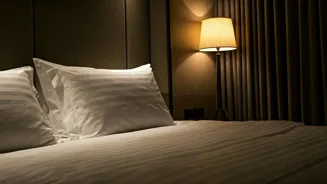The Rise of Rest
Sleep tourism is rapidly gaining traction across India, reflecting a growing awareness of the critical role sleep plays in overall well-being. This trend
goes beyond simply booking a hotel room; it's about curating experiences and environments specifically designed to enhance sleep quality. People are increasingly recognizing the negative impacts of sleep deprivation on both physical and mental health. This movement offers tailored solutions, ranging from specialized retreats to in-room amenities, all aimed at optimizing rest. These options include soundproof rooms, aromatherapy, sleep-inducing teas, and guided meditation sessions. The trend acknowledges that a good night's sleep is not just a luxury, but a necessity, prompting individuals to actively seek out ways to improve their sleep habits and overall health in a holistic manner.
Practices & Destinations
Sleep tourism in India encompasses a wide range of practices and destinations. Various retreats and wellness centers now offer specialized programs focusing on sleep hygiene, stress reduction, and relaxation techniques. Yoga and meditation are often integrated into these programs, leveraging their proven benefits in promoting relaxation and improving sleep. Certain destinations, often located in tranquil natural settings, are particularly popular for sleep tourism. The serene landscapes, from the Himalayas to the coastal regions, provide an ideal backdrop for rest and rejuvenation. These locations offer a break from the hustle and bustle of daily life. These locations frequently offer personalized sleep consultations, providing guests with tailored advice and support. The integration of traditional Ayurvedic practices, known for their calming properties, further enhances the sleep-focused experience.
Beyond the Ordinary
Beyond traditional hotel rooms, sleep tourism is leading to innovative and creative approaches to enhance sleep. Many destinations are incorporating technology designed to monitor and improve sleep patterns. This includes sleep trackers, smart beds that adjust to individual preferences, and light therapy devices to regulate circadian rhythms. The trend also focuses on creating comfortable and conducive sleep environments. The inclusion of blackout curtains, noise machines, and aromatherapy diffusers is becoming increasingly common. Many establishments now offer sleep-themed menus. This incorporates foods known to promote relaxation and sleep, such as herbal teas and light, easily digestible meals. The growth of sleep tourism reflects a broader shift towards holistic wellness. It's about recognizing the importance of sleep as a cornerstone of a healthy lifestyle.
Benefits & Impact
The potential benefits of sleep tourism are vast. Improved sleep can lead to enhanced physical health. This includes improved immune function, reduced risk of chronic diseases, and increased energy levels. It can also significantly improve mental well-being. Better sleep is linked to decreased stress, improved mood, and enhanced cognitive performance. The economic impact of sleep tourism is also noteworthy. It's contributing to the growth of the wellness industry. It encourages investment in related businesses. This includes hotels, resorts, and wellness centers. It also supports the development of new products and services. The trend also has broader societal impacts. It raises public awareness about the importance of sleep. It encourages healthier lifestyles and promotes overall well-being. It can empower individuals to prioritize their health and invest in practices that can improve their sleep quality and, therefore, their quality of life.












